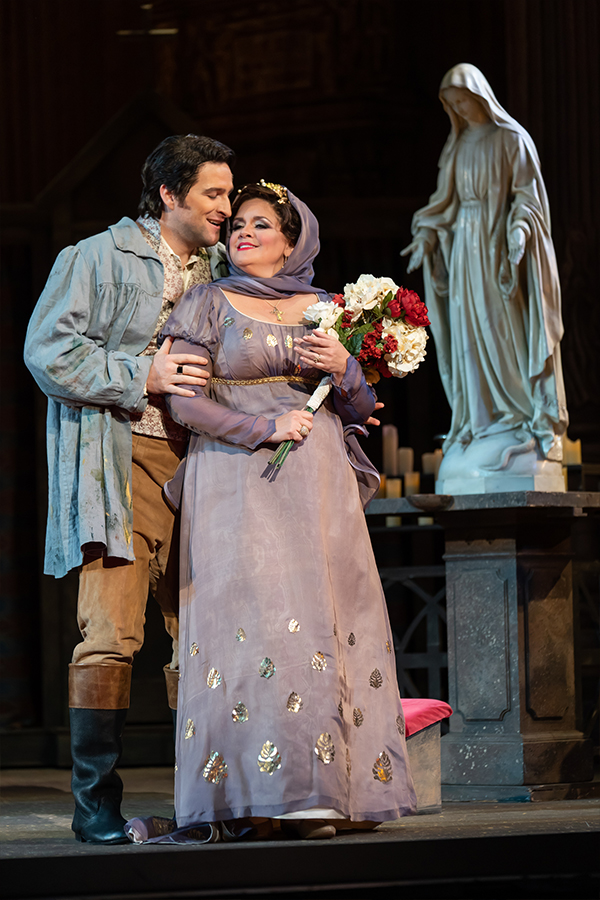WNO wraps season with a visually sumptuous, dramatically tepid “Tosca”

Riccardo Massi and Keri Alkema star in Puccini’s “Tosca” at Washington National Opera.
Washington National Opera is closing its season with a sumptuous Tosca.
Puccini’s opera, which opened Saturday night at the Kennedy Center, features gorgeous sets imported from the Seattle Opera, an orchestra in magnificent form and a cast of mostly young singers who handled Puccini’s lyricism with seemingly effortless ease. Yet while there was jealousy, deceit and corruption galore, what was missing until the final scene was a strong, convincing passion, the ingredient that makes all the rest necessary.
Soprano Keri Alkema, a 2004 alumna of the Domingo-Cafritz Young Artist program, was a Tosca who often seemed to have other things on her mind. Her voice is accurate if not particularly rich, and can soar gloriously at the top of her range but loses its focus at the bottom. Her “Vissi d’arte” began introspectively and stayed there, never quite breaking out into the urgent desperate emotion of a woman who truly feels that God has abandoned her.
Dramatically, Alkema proved a tepid Tosca, sorely lacking the kind of stage presence that makes people notice that you are there. She really never really looked into her the eyes of her lover, the artist Cavaradossi, and even his embraces drew, at best a lukewarm response. Baron Scarpia’s lecherous advances were met with a sort of ho-hum body language and, only at the end, when she realizes that Scarpia, in his treachery, has betrayed his promise to her and has had Cavaradossi killed, is her anguish believable.
Conversely, Riccardo Massi was a heroic Mario Cavaradossi and his third act aria,“E lucevan le stelle,” sung as he waits to be executed, was a highlight of the evening. His voice is a smooth but powerful instrument, even from top to bottom and spiced with the occasional sobs and intensity that make Italian melodrama so enjoyable. His Act Two chest-to-chest confrontation with Scarpia was as powerful as his beaten body, dragged into Scarpia’s quarters, was pitiable.
As the villainous police chief, Baron Scarpia, Alan Held was a mid-level nasty, not quite as scarily lecherous and scheming as the character should be. Yet the baritone proved an imposing figure vocally, and sang impressively with the self-important dignity that a corrupt Roman police official might assume.
Smaller roles were nicely handled. Baritone Michael Hewitt, another Young Artist alum, scampered athletically as Angelotti, the escaped political prisoner sought by Scarpia and rescued by Cavaradossi. As the pious and long-suffering Sacristan, 2016 Young Artist bass Wei Wu mixed his prayers and brush-cleaning duties with resignation and grace, his singing reflecting both with considerable subtlety.
The henchmen, Sciarrone and Spoletta, were well sung by Samson McCrady and David Cangelosi (a splendid character actor). Treble Holden Browne was a fine Shepherd Boy.
The orchestra, however, may be the real star of this production. Led by Speranza Scappucci, the ensemble supported the singers with ideal balances, breathed with them and inflected even the most inconsequential phrases with shapes that mirrored the text. The orchestral sound was lush but never overwhelmed the singers and moved with natural momentum.
Director Ethan McSweeny needed to heat up the drama to a higher level, especially the romantic moments between the lovers and the Act II confrontation between Tosca and Scarpia. He managed better with the crowd.
Lena Rivkina’s costumes were quite handsome and Gary Marder did a terrific job with the lighting, particularly in the last act where a star-sprinkled night sky bloomed into a rosy dawn ever so gently.
Tosca runs through May 25. kennedy-center.org
